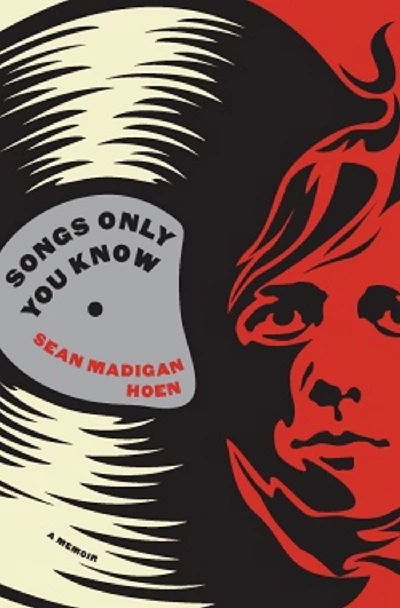Sean Madigan Hoen
-
(Raging Pages) Songs Only You Know
published: 6 /
6 /
2014

In the second instalment of her new book series 'Raging Pages', Lisa Torem examines ex-punk musician Sead Madigan Hoen's new memoir, 'Songs Only You Know'
Article
How many twelve-year-olds would name a clueless terrier after Ozzy Osbourne in tribute to ‘Sabbath Bloody Sabbath?’ Maybe a kid who had already been possessed by pop culture? If you want to penetrate the thoughts of a seething American protagonist who uses the Detroit stage and venues in Cincinnati, Houston, etc., to take out his aggressions during the 1990s, check out ‘Songs Only You Know’ by Sean Madigan Hoen. When the memoir begins, Hoen’s teenage brain is primed for action, his testosterone oozing and his aluminum bat at the bloody ready as he skates you through a decade of denial, explosion, grief and revelation.
Hoen’s music writing abilities surface early on. He somehow translates the classical sounds of the church into his own turbulent compositions. The way he tells it, it’s as if his primal instincts and passion for music often collide. His voice soon becomes a weapon, much like that bat, which marked off his manhood.
Hoen’s family life is disturbing and unsettling. His father is a salt-of-the-earth jack-of-all-trades who sadly slides in and out of rehab. His sister, Caitlin, is physically petite and deeply depressed, and his altruistic mother, the one who seems most like the much-needed rock, just can’t make it all better.
Hoen spends a great deal of time coursing through the motives of his family members and exorcising his feelings of disappointment, sympathy, rage and occasional satisfaction when things do click because, dysfunctional or not, each family member desperately wants to be a contender.
One of the most moving parts of the story is when his generally grounded mother breaks down over an accident involving a stray. By that point in the book, we’re so accustomed to his mother’s ability to move forward that we’re deeply rattled too. When Hoen enjoys sudden bursts of humanity, his relationship with both his father and mother are refreshed, but his relationship with his sister is the most perplexing.
He initially stacks Caitlin’s Escort with hand-picked CD mixes, including the then Chicago-based Smashing Pumpkins, perhaps to introduce her to his preoccupation, but his vulnerable sibling still feels estranged from his mysterious punk performances.
Hoen expresses feelings of self-doubt and self-hatred as he gets caught up in an unforgiving vortex of alcohol and drugs, yet he must be lovable; he dangles two attractive women, Angela and Lauren, who, at various times, offer unconditional almost slavish devotion. Hoen seems to desperately need this love yet the responsibility of keeping it sane seems just too gruelling.
Other women use him as bait when he skulks around drug-houses and street corners to score. When he describes awkward encounters with brassy ladies of the night as he explores the scummy cul-de-sacs of his native city, his reactions to people and place are haunting.
When fronting his Detroit punk trio, Thoughts of Ionesco, Hoen wails like an attacked left-to-die savage. His drummer, Repa, rips apart the drum kit. Little do they understand that they are attracting a following as when they started out, they played for almost nobody and for almost nothing. Part of the subtle humour of the book comes from the interplay between the rootless musicians. And Hoen wants so much to be the good friend to Will, whose stutter could be cured with the right notes.
Later more shenanigans between band members and their self-absorbed mess-of-a-manager, Warden, provide more comic relief. The eventual road trip, which follows a decade of maniacal, although spotty music making, is gross, unpredictable, hilarious and heartbreaking.
If your stomach churns from vivid descriptions of drug usage, you can leaf through a few of those passages, yet you’d be cheating yourself. Those episodes are executed with poise and poetry.
Sean Madigan Hoen has certainly and honestly put his rage to the page. This is a deeply personal portrait; so personal you may feel as though you’re a voyeur and you’ve inadvertently trespassed. Ignore the imaginary sign in your head and press on. This is an unbelievable debut.